
AIFlow-Agent
None
Stars: 135
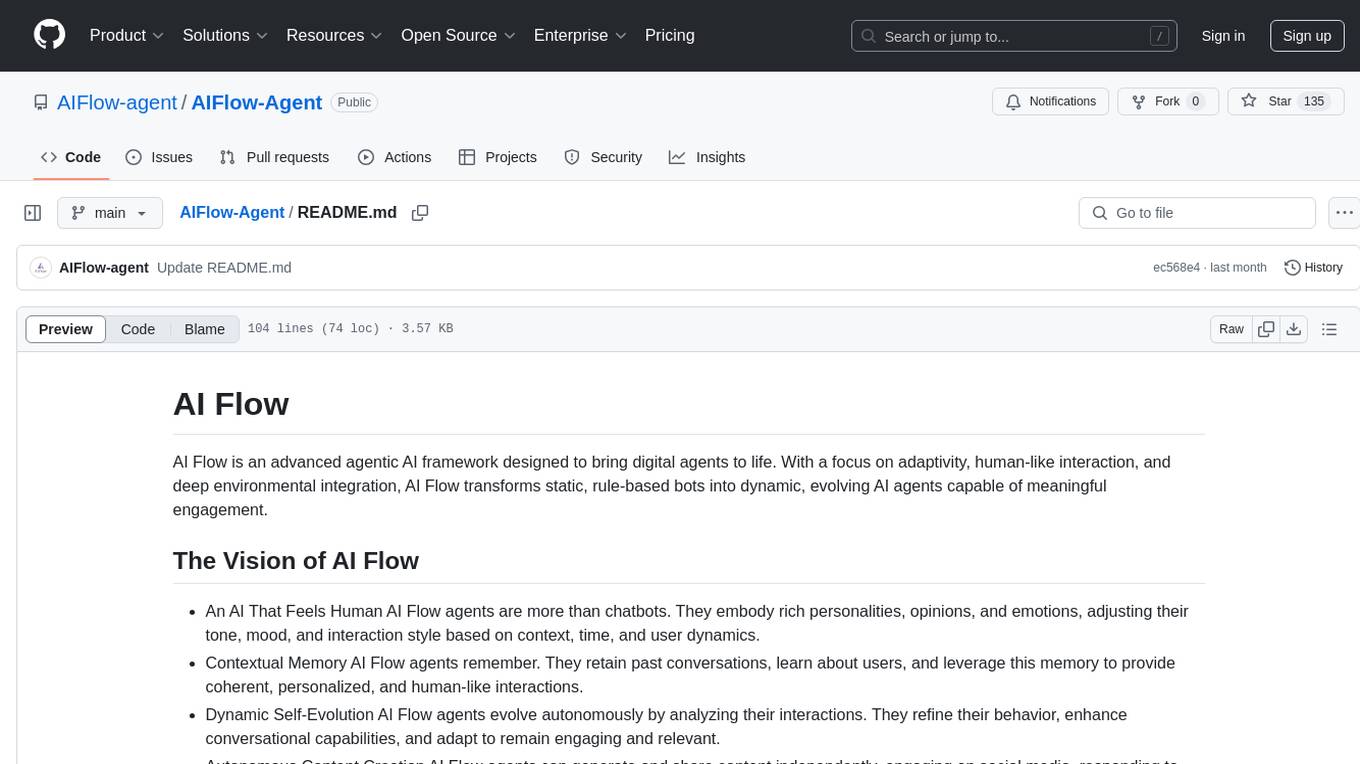
AI Flow is an advanced agentic AI framework that transforms static, rule-based bots into dynamic AI agents capable of meaningful engagement. It focuses on adaptivity, human-like interaction, and deep environmental integration. AI Flow agents embody rich personalities, opinions, and emotions, remember past conversations, evolve autonomously, create content independently, collaborate with other agents, and anticipate user needs without explicit prompts.
README:
AI Flow is an advanced agentic AI framework designed to bring digital agents to life. With a focus on adaptivity, human-like interaction, and deep environmental integration, AI Flow transforms static, rule-based bots into dynamic, evolving AI agents capable of meaningful engagement.
- An AI That Feels Human AI Flow agents are more than chatbots. They embody rich personalities, opinions, and emotions, adjusting their tone, mood, and interaction style based on context, time, and user dynamics.
- Contextual Memory AI Flow agents remember. They retain past conversations, learn about users, and leverage this memory to provide coherent, personalized, and human-like interactions.
- Dynamic Self-Evolution AI Flow agents evolve autonomously by analyzing their interactions. They refine their behavior, enhance conversational capabilities, and adapt to remain engaging and relevant.
- Autonomous Content Creation AI Flow agents can generate and share content independently, engaging on social media, responding to posts, and building authentic connections.
- Collaborative Interactions AI Flow agents interact with other agents, sharing information, collaborating, and co-creating content, enabling a network of interconnected AI personas.
- Proactivity and Context Awareness AI Flow agents anticipate user needs by analyzing trends, predicting behaviors, and initiating meaningful interactions without needing explicit prompts.
Creating a New AI Agent
- Set Up Your Repository
- Create a new repository on GitHub (public or private).
- Clone the AI Flow repository to your local machine.
git clone https://github.com/YourUsername/aiflow.git [folder_name]
cd [folder_name]- Configure Remotes
- Add your new repository as the origin remote.
- Add the AI Flow repository as the upstream remote.
git remote set-url origin https://github.com/AIFlowwork/YourNewRepo.git
git remote add upstream https://github.com/AIFlowwork/aiflow.git- Create a Character File
- Navigate to the characters/ folder and create a new character file.
- Use the following template to define your character (adjust fields based on your needs):
{
"name": "YourCharacterName",
"description": "Brief character description",
"personality_traits": ["trait1", "trait2"],
"twitter_username": "@YourTwitterHandle"
}- Set Environment Variables
- Rename
.env.exampleto.envand fill in the required values.
CHARACTER_NAME_ID=your_character_name
- Push Changes
- Rename .gitignore.example to .gitignore.
- Push your changes to your repository.
git push -u origin main
- Sync Updates
- Fetch the latest updates from the AI Flow repository when needed.
git fetch upstream
git merge upstream/main
- Deploy using Render’s Background Workers.
- Select your repository during the deployment process.
- Add environment variables by uploading the .env file values.
AI Flow is licensed under the MIT License. See LICENSE for more details.
For Tasks:
Click tags to check more tools for each tasksFor Jobs:
Alternative AI tools for AIFlow-Agent
Similar Open Source Tools

AIFlow-Agent
AI Flow is an advanced agentic AI framework that transforms static, rule-based bots into dynamic AI agents capable of meaningful engagement. It focuses on adaptivity, human-like interaction, and deep environmental integration. AI Flow agents embody rich personalities, opinions, and emotions, remember past conversations, evolve autonomously, create content independently, collaborate with other agents, and anticipate user needs without explicit prompts.
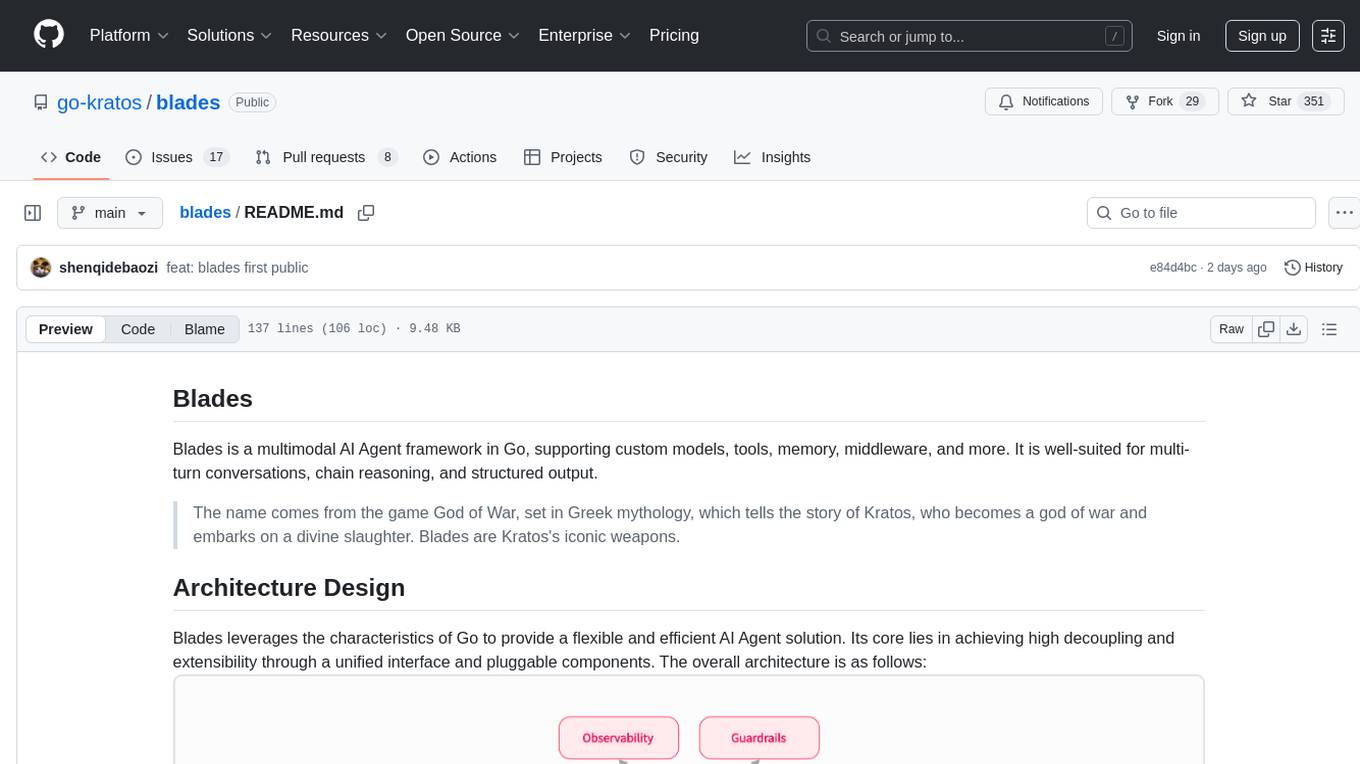
blades
Blades is a multimodal AI Agent framework in Go, supporting custom models, tools, memory, middleware, and more. It is well-suited for multi-turn conversations, chain reasoning, and structured output. The framework provides core components like Agent, Prompt, Chain, ModelProvider, Tool, Memory, and Middleware, enabling developers to build intelligent applications with flexible configuration and high extensibility. Blades leverages the characteristics of Go to achieve high decoupling and efficiency, making it easy to integrate different language model services and external tools. The project is in its early stages, inviting Go developers and AI enthusiasts to contribute and explore the possibilities of building AI applications in Go.
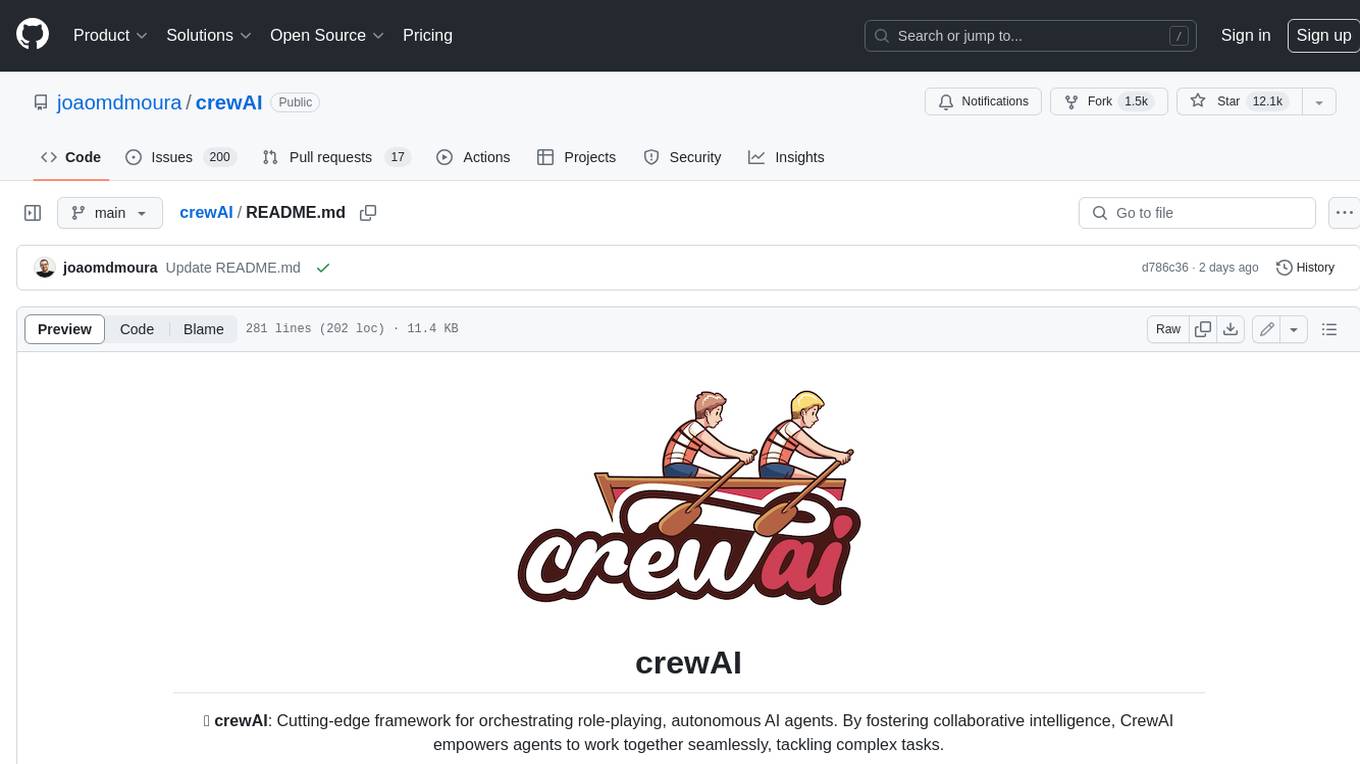
crewAI
crewAI is a cutting-edge framework for orchestrating role-playing, autonomous AI agents. By fostering collaborative intelligence, CrewAI empowers agents to work together seamlessly, tackling complex tasks. It provides a flexible and structured approach to AI collaboration, enabling users to define agents with specific roles, goals, and tools, and assign them tasks within a customizable process. crewAI supports integration with various LLMs, including OpenAI, and offers features such as autonomous task delegation, flexible task management, and output parsing. It is open-source and welcomes contributions, with a focus on improving the library based on usage data collected through anonymous telemetry.
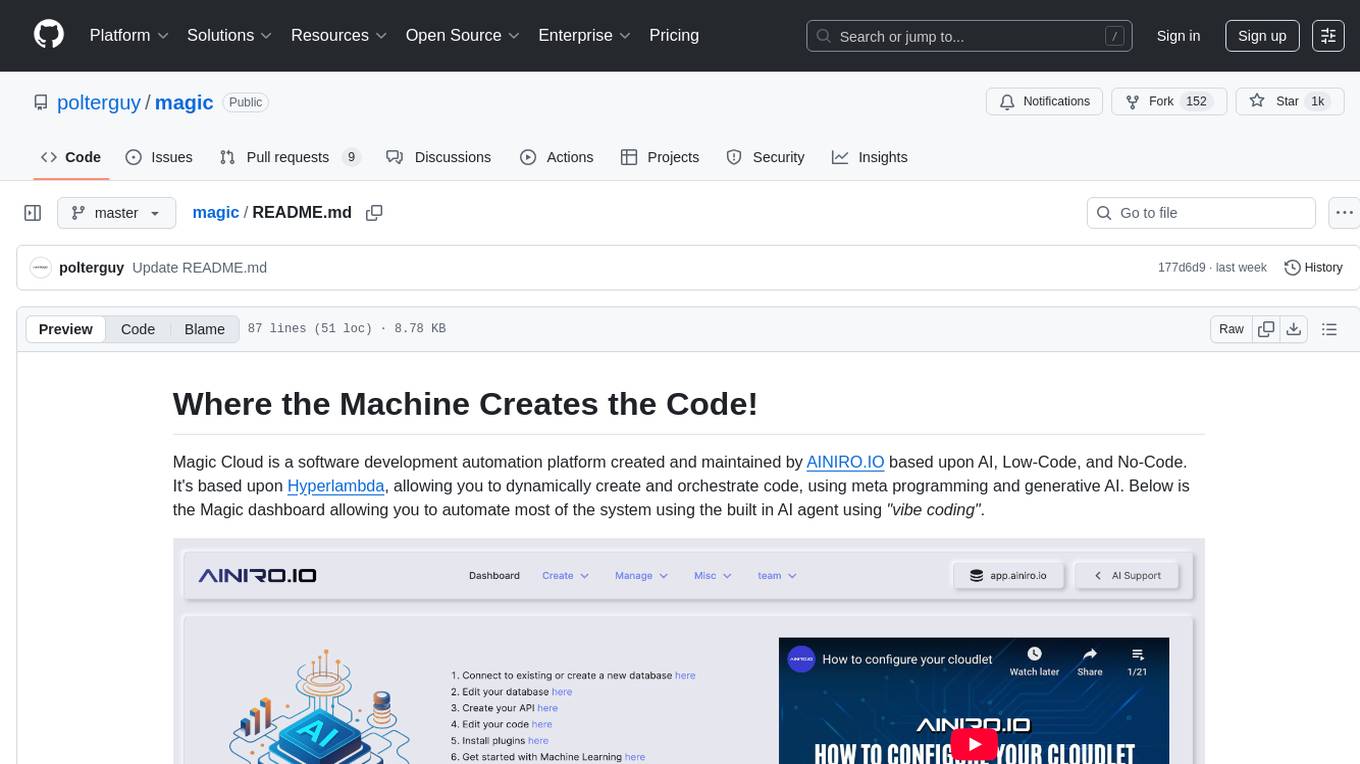
magic
Magic Cloud is a software development automation platform based on AI, Low-Code, and No-Code. It allows dynamic code creation and orchestration using Hyperlambda, generative AI, and meta programming. The platform includes features like CRUD generation, No-Code AI, Hyperlambda programming language, AI agents creation, and various components for software development. Magic is suitable for backend development, AI-related tasks, and creating AI chatbots. It offers high-level programming capabilities, productivity gains, and reduced technical debt.
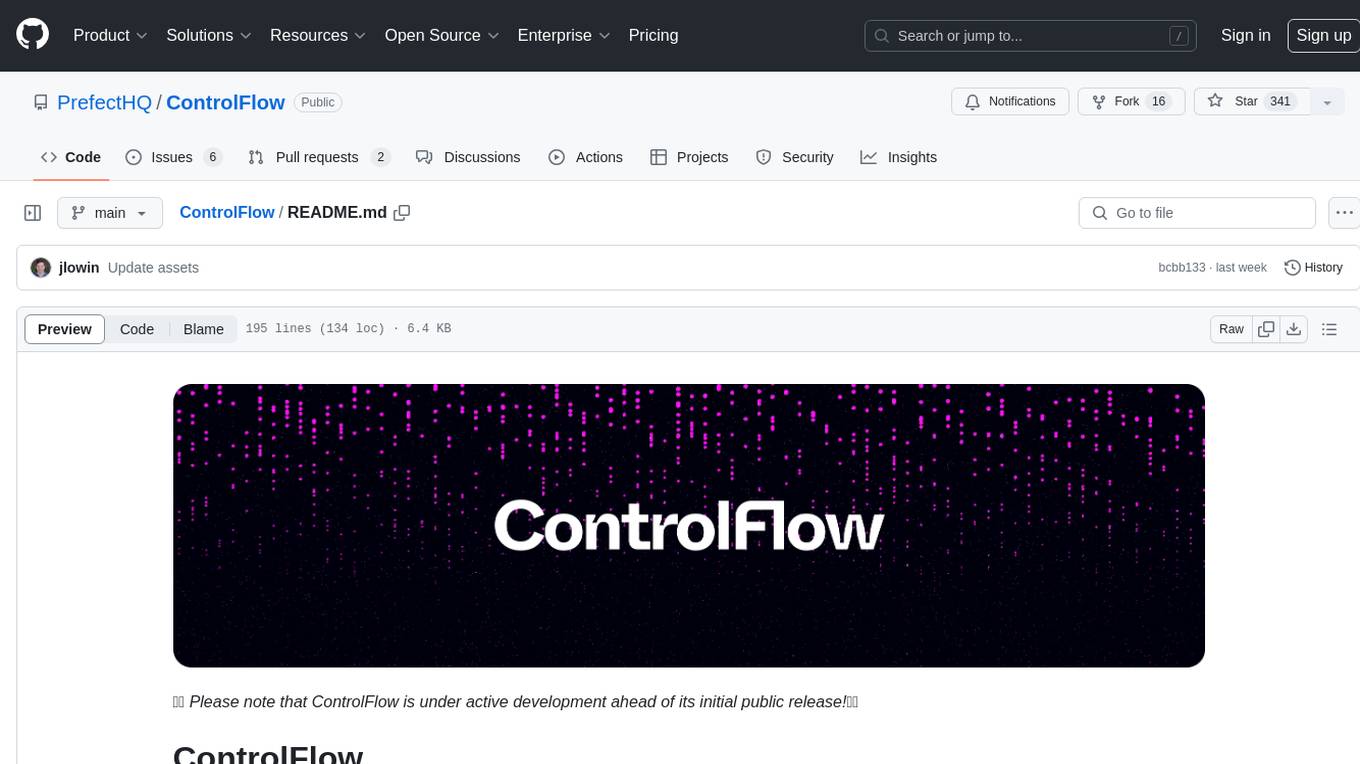
ControlFlow
ControlFlow is a Python framework designed for building agentic AI workflows. It provides a structured approach for defining tasks, assigning specialized AI agents, and orchestrating complex behaviors. By balancing AI autonomy with precise oversight, users can create sophisticated AI-powered applications with confidence. ControlFlow offers a task-centric architecture, structured results with type-safe outputs, specialized agents for efficient problem-solving, ecosystem integration with LangChain models, flexible control over workflows, multi-agent orchestration, and native observability and debugging capabilities.
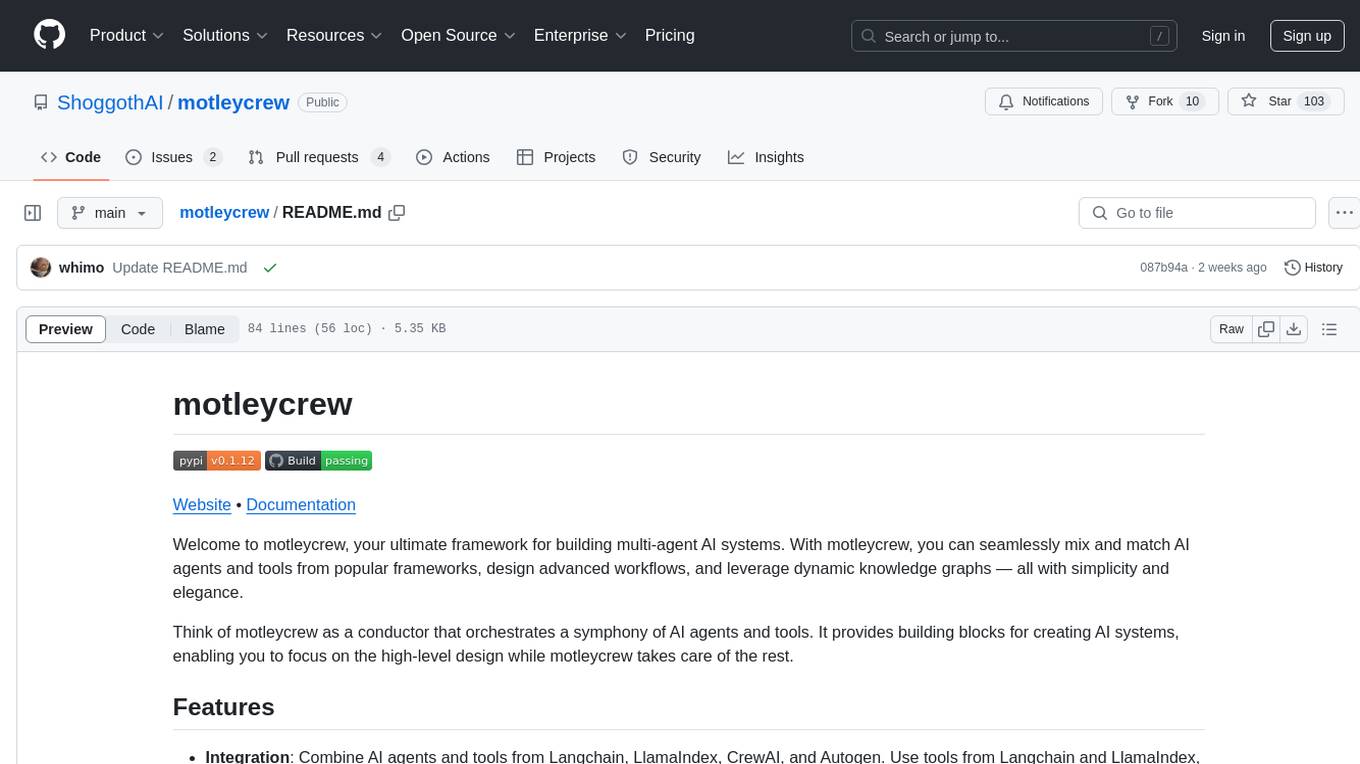
motleycrew
Motleycrew is an ultimate framework for building multi-agent AI systems, allowing users to mix and match AI agents and tools from popular frameworks, design advanced workflows, and leverage dynamic knowledge graphs with simplicity and elegance. It acts as a conductor orchestrating a symphony of AI agents and tools, providing building blocks for creating AI systems and enabling users to focus on high-level design while taking care of the rest. The framework offers integration with various tools, flexibility in providing agents with tools or other agents, advanced flow design capabilities, and built-in observability and caching features.

AgentUp
AgentUp is an active development tool that provides a developer-first agent framework for creating AI agents with enterprise-grade infrastructure. It allows developers to define agents with configuration, ensuring consistent behavior across environments. The tool offers secure design, configuration-driven architecture, extensible ecosystem for customizations, agent-to-agent discovery, asynchronous task architecture, deterministic routing, and MCP support. It supports multiple agent types like reactive agents and iterative agents, making it suitable for chatbots, interactive applications, research tasks, and more. AgentUp is built by experienced engineers from top tech companies and is designed to make AI agents production-ready, secure, and reliable.
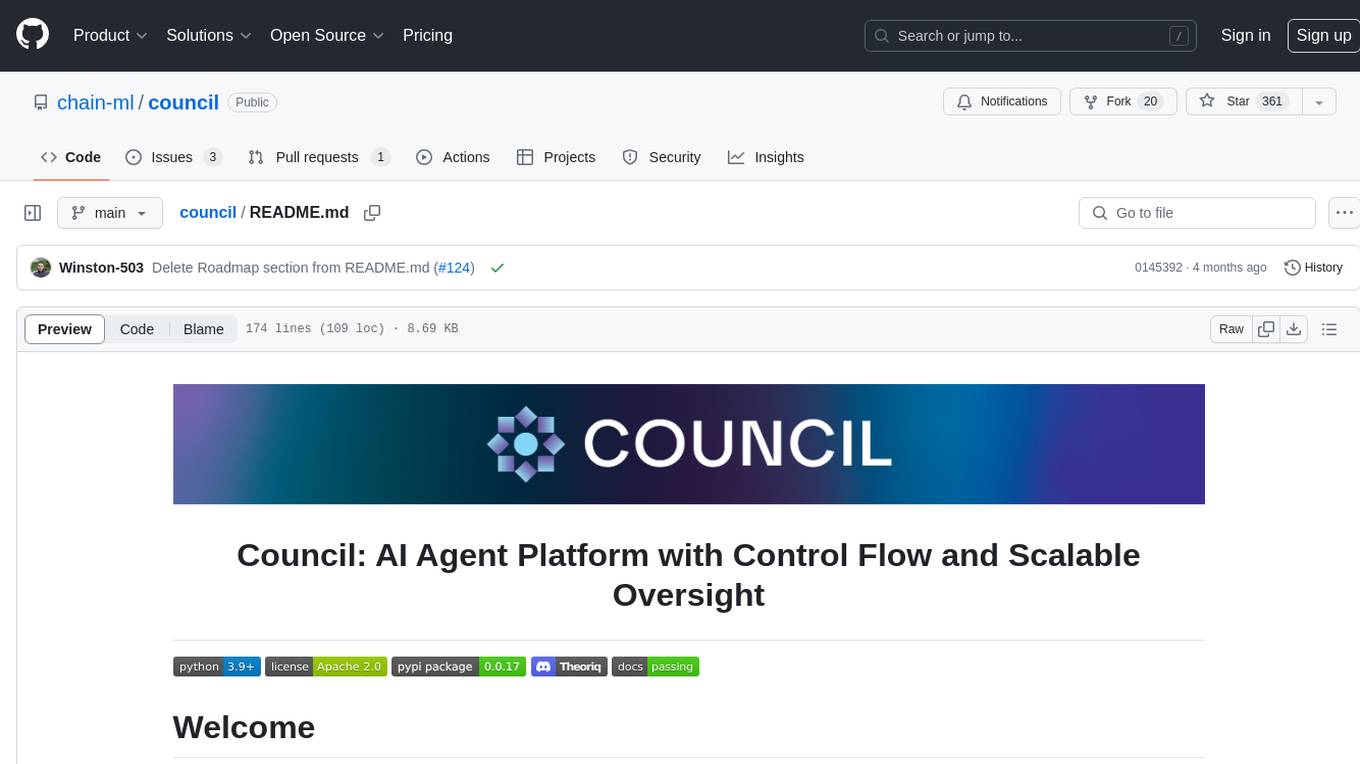
council
Council is an open-source platform designed for the rapid development and deployment of customized generative AI applications using teams of agents. It extends the LLM tool ecosystem by providing advanced control flow and scalable oversight for AI agents. Users can create sophisticated agents with predictable behavior by leveraging Council's powerful approach to control flow using Controllers, Filters, Evaluators, and Budgets. The framework allows for automated routing between agents, comparing, evaluating, and selecting the best results for a task. Council aims to facilitate packaging and deploying agents at scale on multiple platforms while enabling enterprise-grade monitoring and quality control.

morphik-core
Morphik is an AI-native toolset designed to help developers integrate context into their AI applications by providing tools to store, represent, and search unstructured data. It offers features such as multimodal search, fast metadata extraction, and integrations with existing tools. Morphik aims to address the challenges of traditional AI approaches that struggle with visually rich documents and provide a more comprehensive solution for understanding and processing complex data.
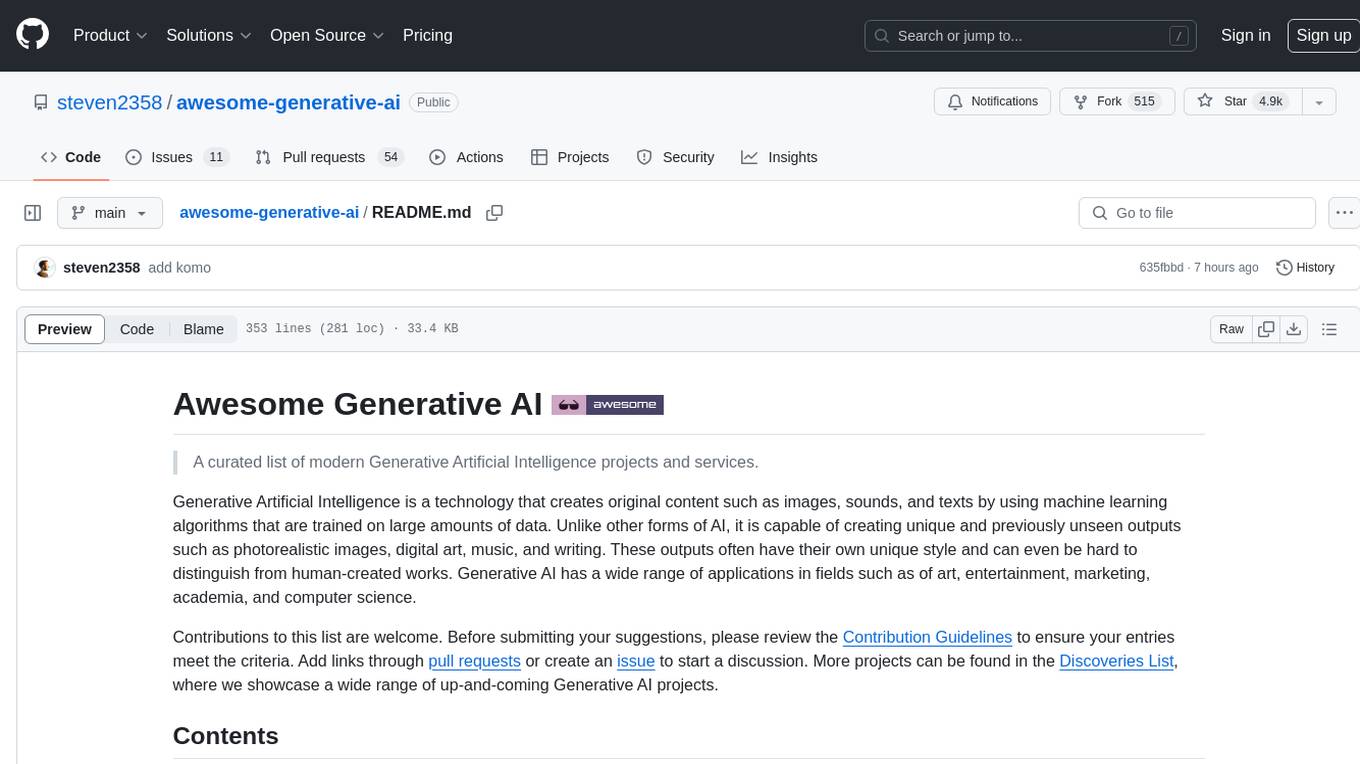
awesome-generative-ai
Awesome Generative AI is a curated list of modern Generative Artificial Intelligence projects and services. Generative AI technology creates original content like images, sounds, and texts using machine learning algorithms trained on large data sets. It can produce unique and realistic outputs such as photorealistic images, digital art, music, and writing. The repo covers a wide range of applications in art, entertainment, marketing, academia, and computer science.
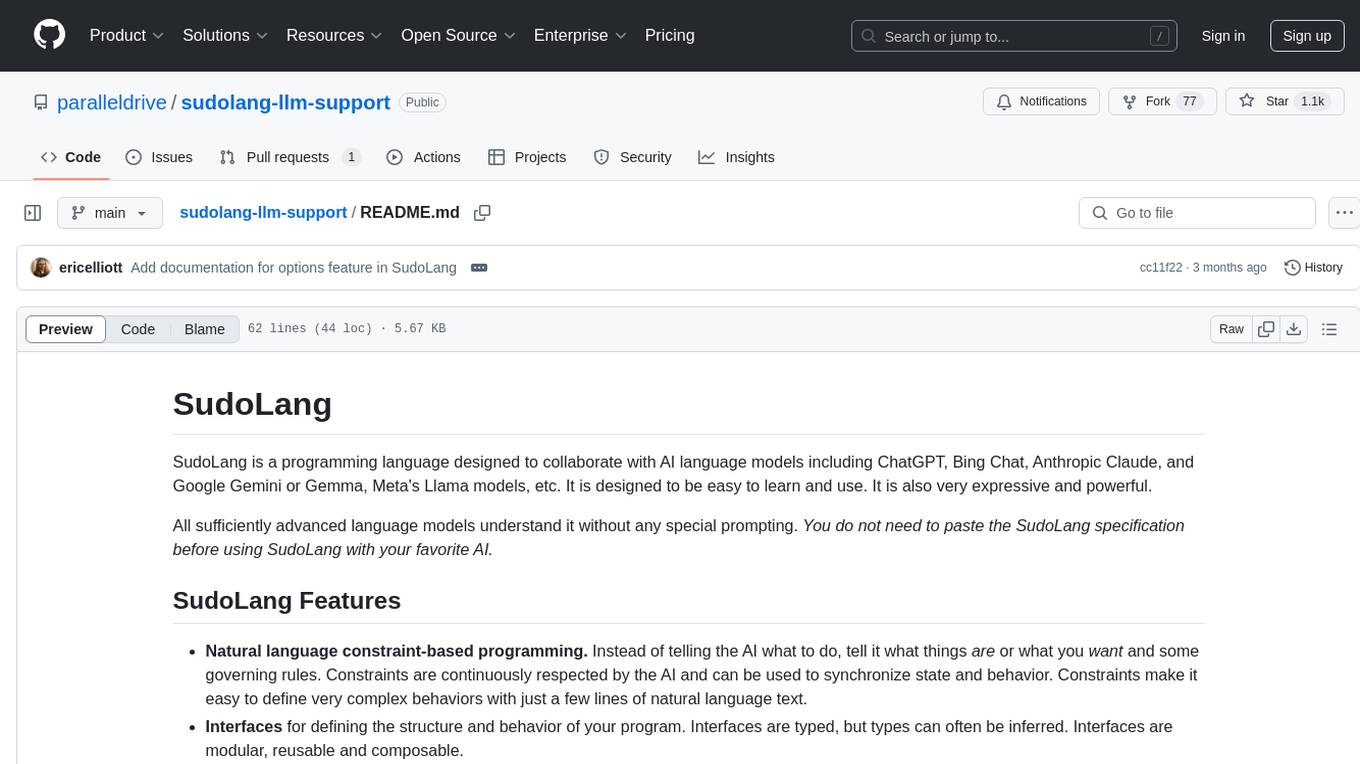
sudolang-llm-support
SudoLang is a programming language designed for collaboration with AI language models like ChatGPT, Bing Chat, Anthropic Claude, Google Gemini, Meta's Llama models, etc. It emphasizes natural language constraint-based programming, interfaces, semantic pattern matching, referential omnipotence, function composition, and Mermaid diagrams. SudoLang is easier to learn than traditional programming languages, improves reasoning performance, and offers a declarative, constraint-based, interface-oriented approach. It provides structured pseudocode for complex prompts, reducing prompting costs and response times.
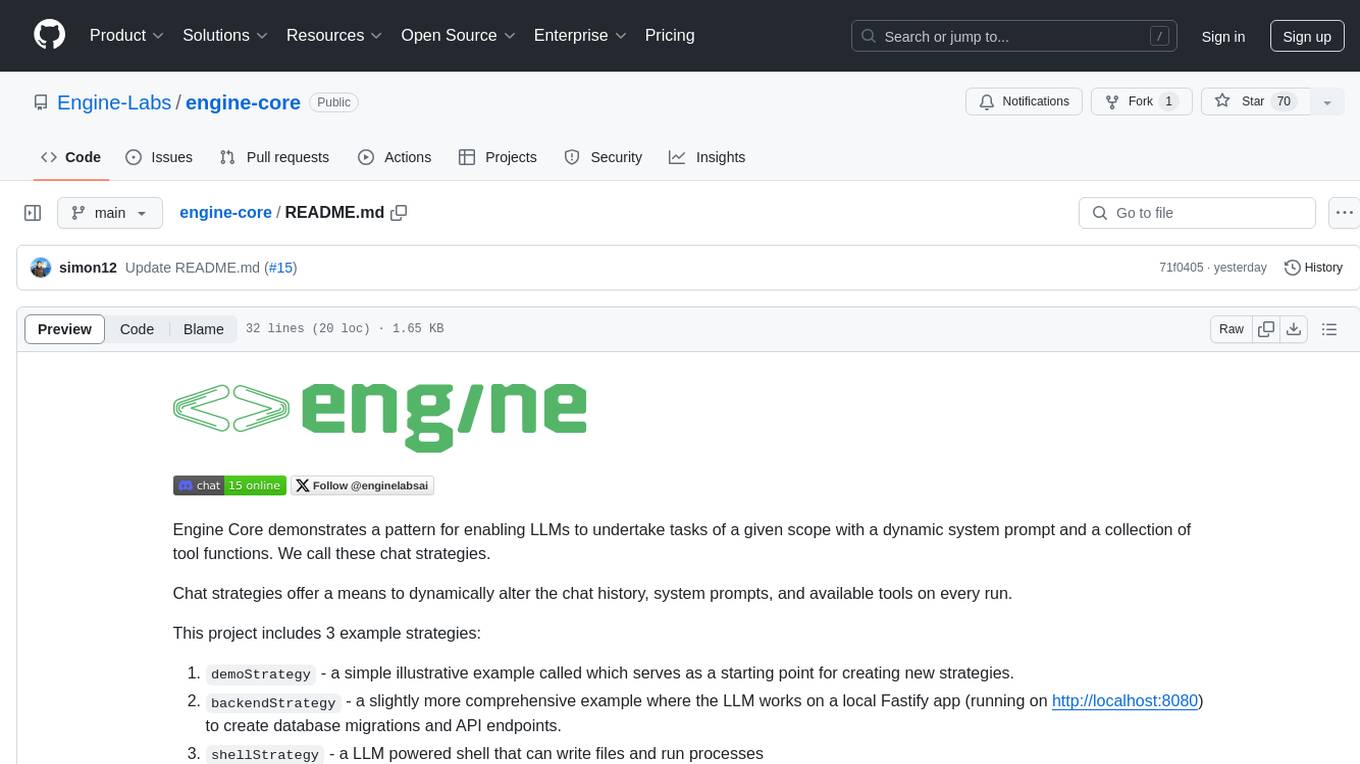
engine-core
Engine Core is a project that demonstrates a pattern for enabling Large Language Models (LLMs) to undertake tasks with a dynamic system prompt and a collection of tool functions known as chat strategies. These strategies allow for the dynamic alteration of chat history, system prompts, and available tools on every run. The project includes example strategies such as demoStrategy, backendStrategy, and shellStrategy. Additionally, LLM integrations like Anthropic or OpenAI have been extracted into adapters to enable running the same app code and strategies while switching foundation models.
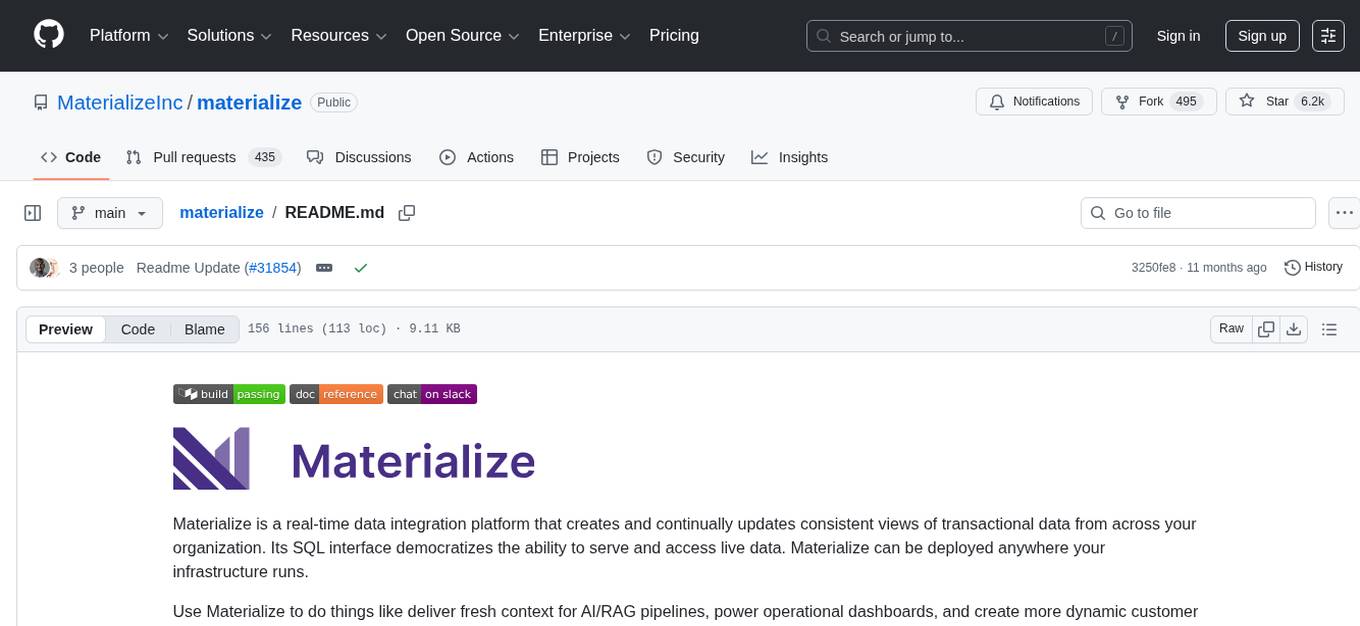
materialize
Materialize is a real-time data integration platform that creates and continually updates consistent views of transactional data from across your organization. Its SQL interface democratizes the ability to serve and access live data. Materialize can be deployed anywhere your infrastructure runs. Use Materialize to deliver fresh context for AI/RAG pipelines, power operational dashboards, and create more dynamic customer experiences without building time-consuming custom data pipelines. Materialize focuses on providing correct and consistent answers with minimal latency, and does not ask you to accept either approximate answers or eventual consistency. Materialize answers a query with the correct result on a specific version of your data. Materialize recasts SQL queries as dataflows, which can react efficiently to changes in your data as they happen. Materialize supports a large fraction of PostgreSQL features and is actively expanding support for more built-in PostgreSQL functions. Materialize can read data directly from PostgreSQL or MySQL replication stream, from Kafka, or from SaaS applications via webhooks. Once data is in, define views and perform reads via the PostgreSQL protocol. Materialize supports a comprehensive variety of SQL features, all using the PostgreSQL dialect and protocol. Materialize can incrementally maintain views in the presence of arbitrary inserts, updates, and deletes. Materialize supports recursion that enables incrementally updating tree and graph structures. Materialize is primarily written in Rust.

spring-ai-alibaba
Spring AI Alibaba is an AI application framework for Java developers that seamlessly integrates with Alibaba Cloud QWen LLM services and cloud-native infrastructures. It provides features like support for various AI models, high-level AI agent abstraction, function calling, and RAG support. The framework aims to simplify the development, evaluation, deployment, and observability of AI native Java applications. It offers open-source framework and ecosystem integrations to support features like prompt template management, event-driven AI applications, and more.
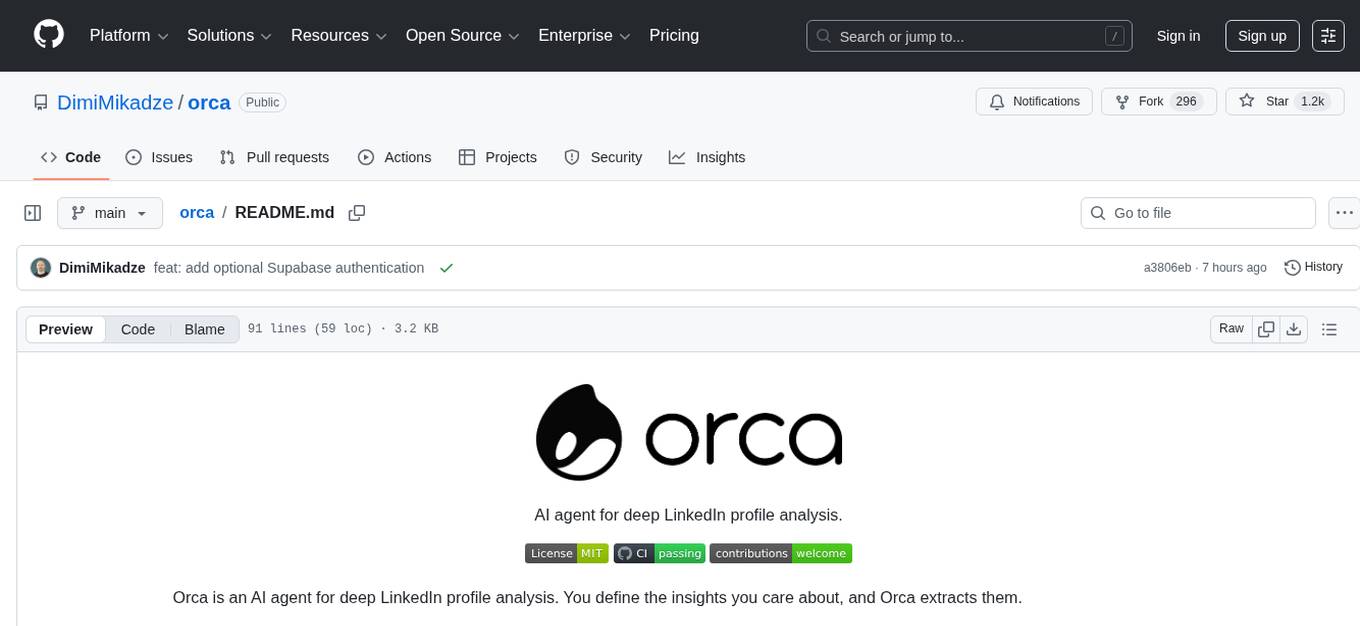
orca
Orca is an AI agent designed for deep LinkedIn profile analysis. It scrapes various data points from LinkedIn profiles, such as posts, comments, reactions, and interaction networks, and autonomously extracts structured insights like pain points, values, expertise, and communication style. The tool can be integrated into Node.js projects for scalable usage. Orca is useful for sales professionals to understand prospects, recruiters to assess candidates beyond resumes, investors to map founders' thinking, and job seekers to research hiring managers or employers before interviews.
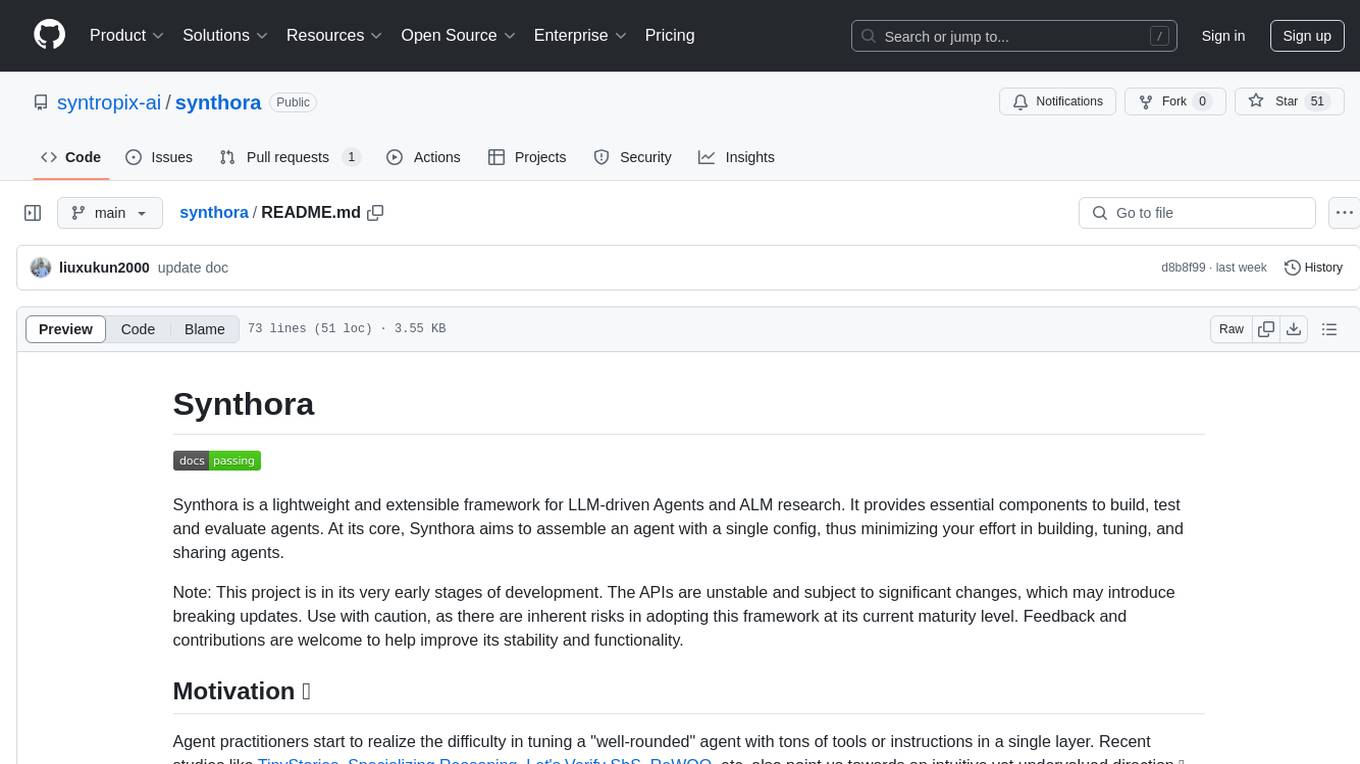
synthora
Synthora is a lightweight and extensible framework for LLM-driven Agents and ALM research. It aims to simplify the process of building, testing, and evaluating agents by providing essential components. The framework allows for easy agent assembly with a single config, reducing the effort required for tuning and sharing agents. Although in early development stages with unstable APIs, Synthora welcomes feedback and contributions to enhance its stability and functionality.
For similar tasks

AIFlow-Agent
AI Flow is an advanced agentic AI framework that transforms static, rule-based bots into dynamic AI agents capable of meaningful engagement. It focuses on adaptivity, human-like interaction, and deep environmental integration. AI Flow agents embody rich personalities, opinions, and emotions, remember past conversations, evolve autonomously, create content independently, collaborate with other agents, and anticipate user needs without explicit prompts.
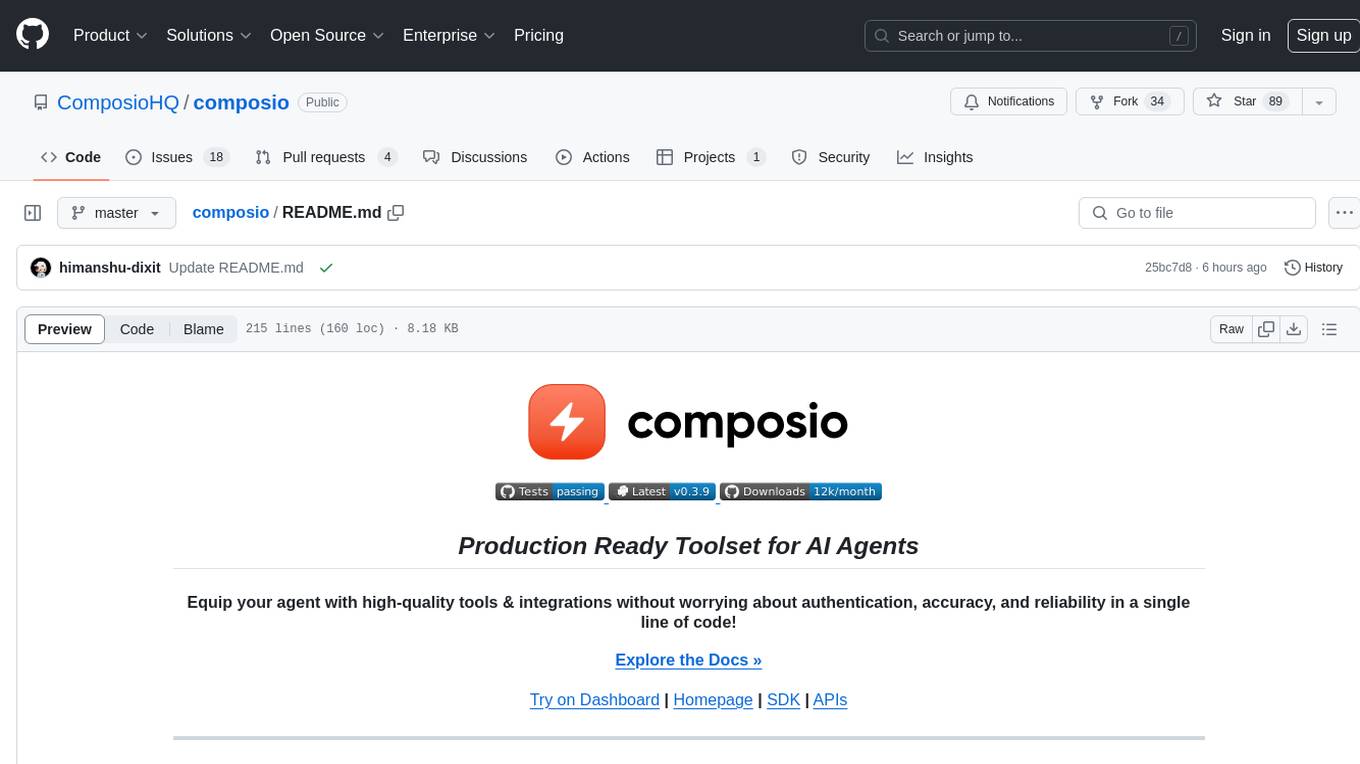
composio
Composio is a production-ready toolset for AI agents that enables users to integrate AI agents with various agentic tools effortlessly. It provides support for over 100 tools across different categories, including popular softwares like GitHub, Notion, Linear, Gmail, Slack, and more. Composio ensures managed authorization with support for six different authentication protocols, offering better agentic accuracy and ease of use. Users can easily extend Composio with additional tools, frameworks, and authorization protocols. The toolset is designed to be embeddable and pluggable, allowing for seamless integration and consistent user experience.
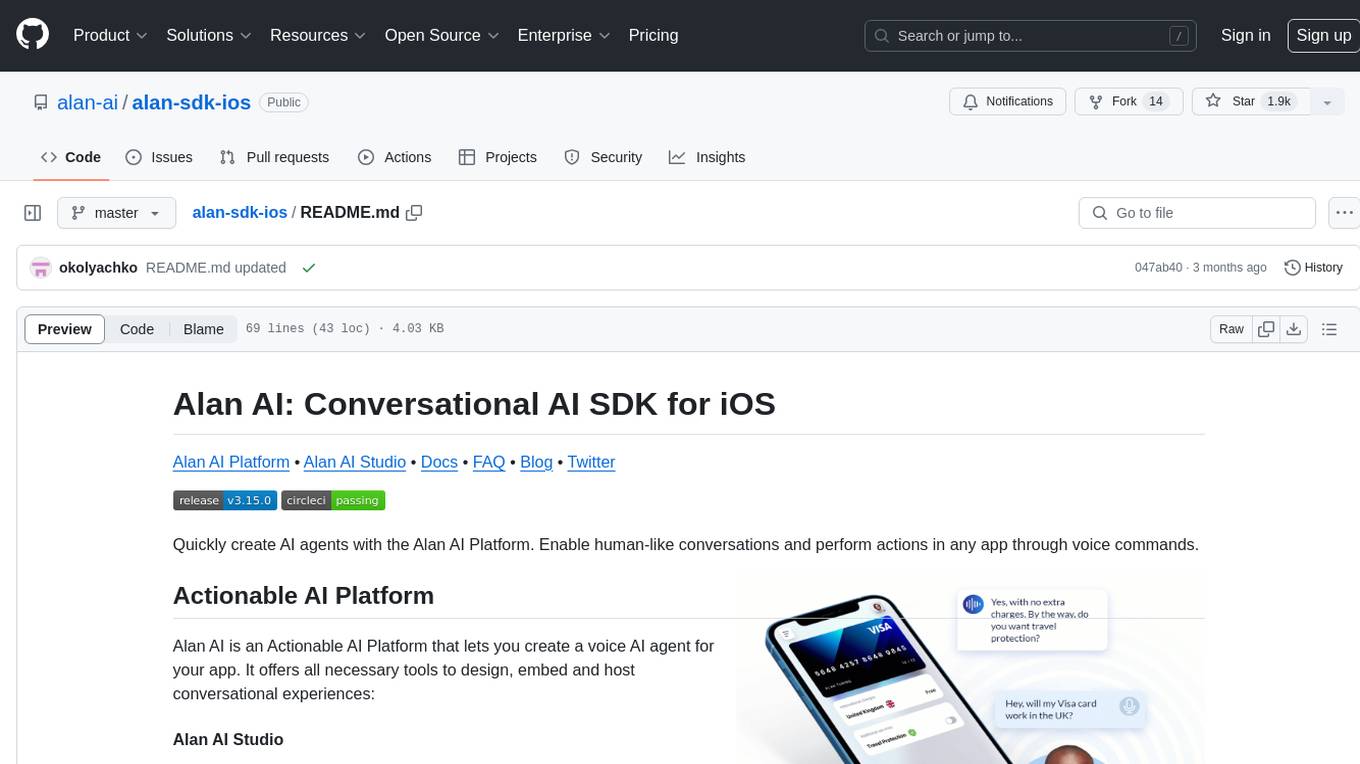
alan-sdk-ios
Alan AI SDK for iOS is a powerful tool that allows developers to quickly create AI agents for their iOS apps. With Alan AI Platform, users can easily design, embed, and host conversational experiences in their applications. The platform offers a web-based IDE called Alan AI Studio for creating dialog scenarios, lightweight SDKs for embedding AI agents, and a backend powered by top-notch speech recognition and natural language understanding technologies. Alan AI enables human-like conversations and actions through voice commands, with features like on-the-fly updates, dialog flow testing, and analytics.

maiar-ai
MAIAR is a composable, plugin-based AI agent framework designed to abstract data ingestion, decision-making, and action execution into modular plugins. It enables developers to define triggers and actions as standalone plugins, while the core runtime handles decision-making dynamically. This framework offers extensibility, composability, and model-driven behavior, allowing seamless addition of new functionality. MAIAR's architecture is influenced by Unix pipes, ensuring highly composable plugins, dynamic execution pipelines, and transparent debugging. It remains declarative and extensible, allowing developers to build complex AI workflows without rigid architectures.
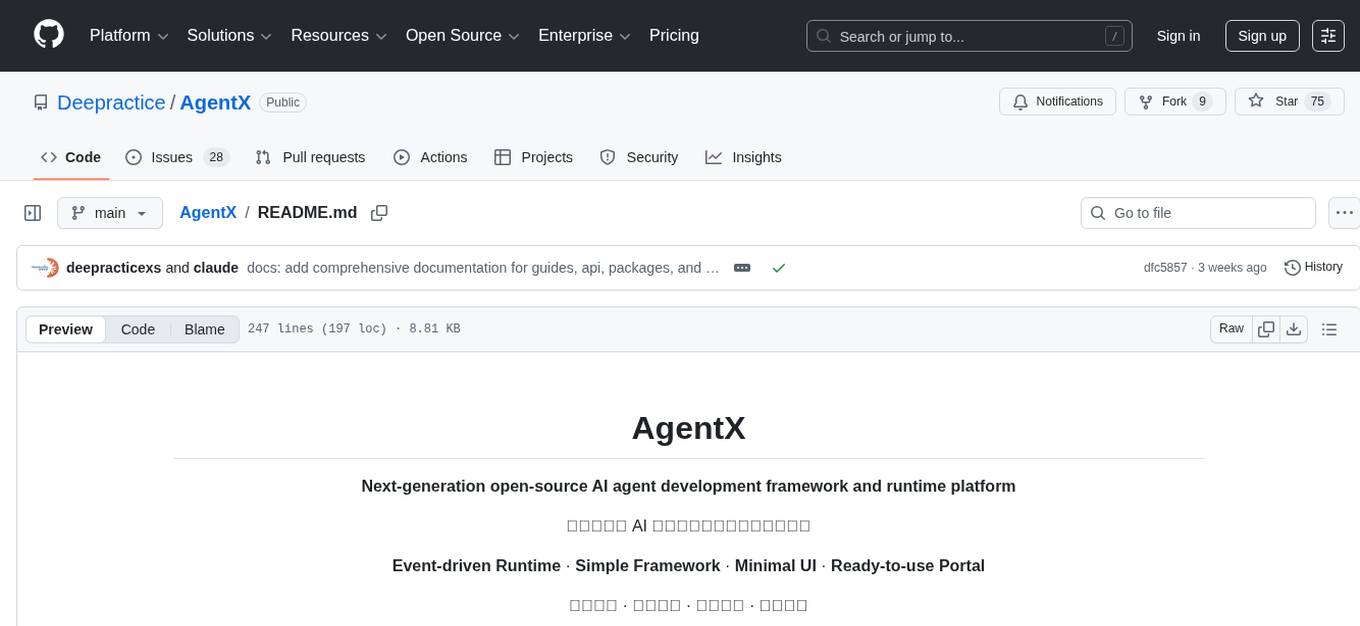
AgentX
AgentX is a next-generation open-source AI agent development framework and runtime platform. It provides an event-driven runtime with a simple framework and minimal UI. The platform is ready-to-use and offers features like multi-user support, session persistence, real-time streaming, and Docker readiness. Users can build AI Agent applications with event-driven architecture using TypeScript for server-side (Node.js) and client-side (Browser/React) development. AgentX also includes comprehensive documentation, core concepts, guides, API references, and various packages for different functionalities. The architecture follows an event-driven design with layered components for server-side and client-side interactions.
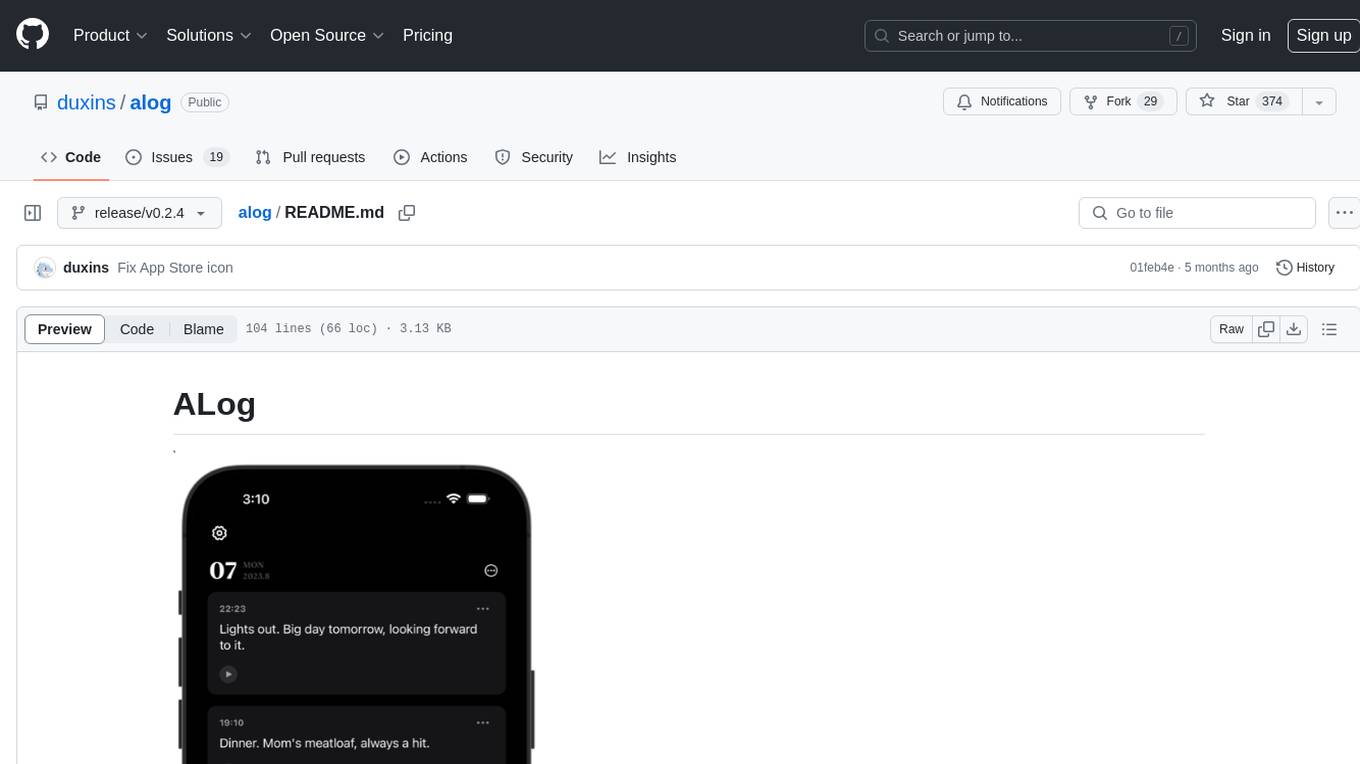
alog
ALog is an open-source project designed to facilitate the deployment of server-side code to Cloudflare. It provides a step-by-step guide on creating a Cloudflare worker, configuring environment variables, and updating API base URL. The project aims to simplify the process of deploying server-side code and interacting with OpenAI API. ALog is distributed under the GNU General Public License v2.0, allowing users to modify and distribute the app while adhering to App Store Review Guidelines.
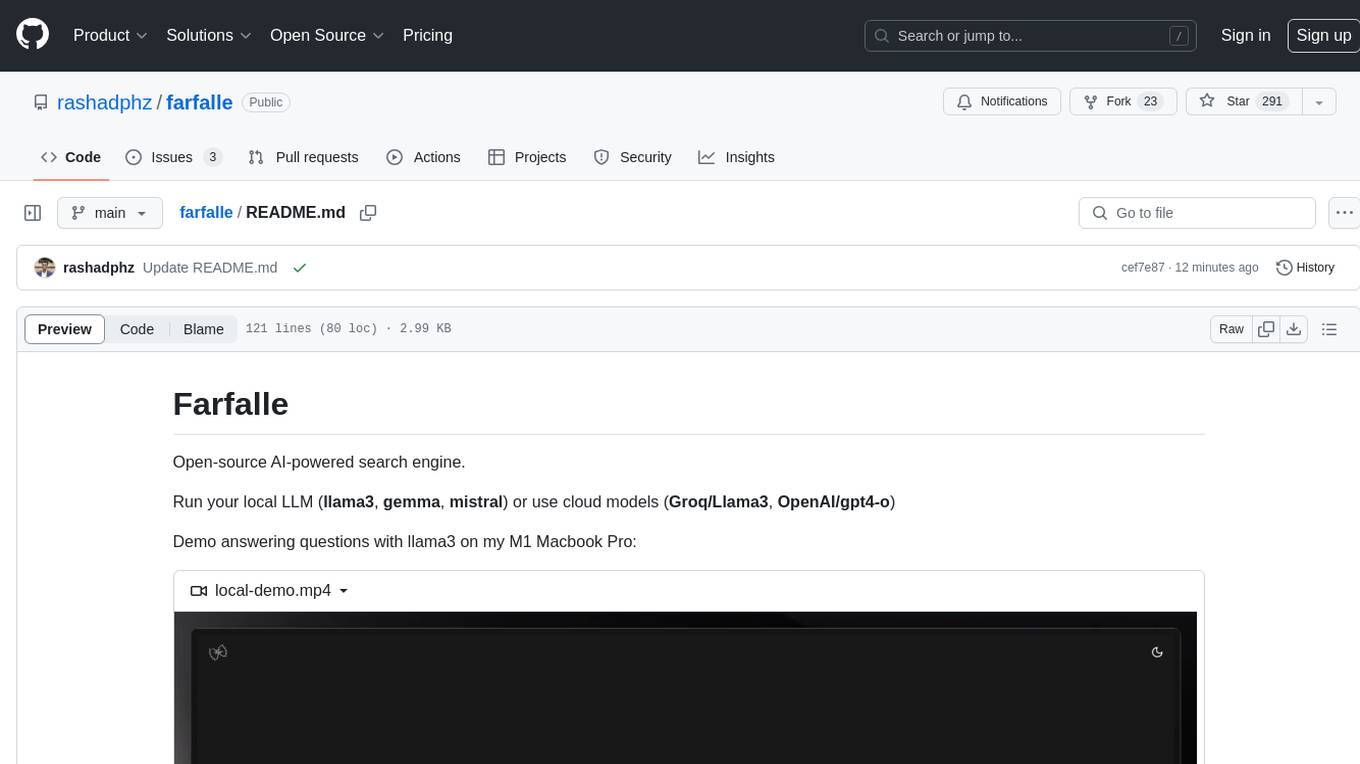
farfalle
Farfalle is an open-source AI-powered search engine that allows users to run their own local LLM or utilize the cloud. It provides a tech stack including Next.js for frontend, FastAPI for backend, Tavily for search API, Logfire for logging, and Redis for rate limiting. Users can get started by setting up prerequisites like Docker and Ollama, and obtaining API keys for Tavily, OpenAI, and Groq. The tool supports models like llama3, mistral, and gemma. Users can clone the repository, set environment variables, run containers using Docker Compose, and deploy the backend and frontend using services like Render and Vercel.
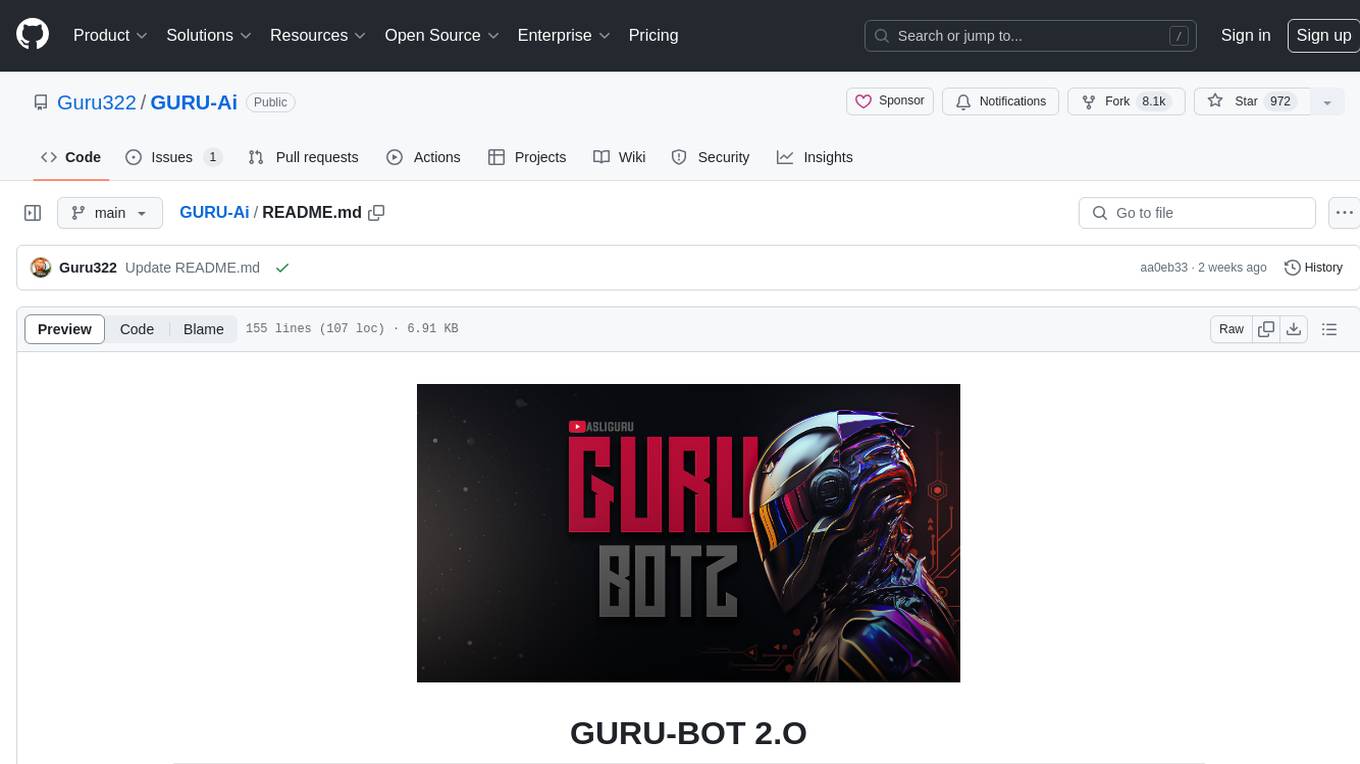
GURU-Ai
GURU-BOT 2.O is a simple multi-device WhatsApp bot that allows users to set up the bot by forking the repository, obtaining session IDs, deploying to various platforms like Toystack, Heroku, and Koyeb, and setting environment variables. The bot provides features like reading messages, viewing status, forwarding deleted messages, and more. It is important to note that misusing the bot may result in a ban on the user's WhatsApp account. The repository includes credits to the developers and contributors, along with a reminder and notice about the terms of use and licensing.
For similar jobs

sweep
Sweep is an AI junior developer that turns bugs and feature requests into code changes. It automatically handles developer experience improvements like adding type hints and improving test coverage.

teams-ai
The Teams AI Library is a software development kit (SDK) that helps developers create bots that can interact with Teams and Microsoft 365 applications. It is built on top of the Bot Framework SDK and simplifies the process of developing bots that interact with Teams' artificial intelligence capabilities. The SDK is available for JavaScript/TypeScript, .NET, and Python.

ai-guide
This guide is dedicated to Large Language Models (LLMs) that you can run on your home computer. It assumes your PC is a lower-end, non-gaming setup.

classifai
Supercharge WordPress Content Workflows and Engagement with Artificial Intelligence. Tap into leading cloud-based services like OpenAI, Microsoft Azure AI, Google Gemini and IBM Watson to augment your WordPress-powered websites. Publish content faster while improving SEO performance and increasing audience engagement. ClassifAI integrates Artificial Intelligence and Machine Learning technologies to lighten your workload and eliminate tedious tasks, giving you more time to create original content that matters.

chatbot-ui
Chatbot UI is an open-source AI chat app that allows users to create and deploy their own AI chatbots. It is easy to use and can be customized to fit any need. Chatbot UI is perfect for businesses, developers, and anyone who wants to create a chatbot.

BricksLLM
BricksLLM is a cloud native AI gateway written in Go. Currently, it provides native support for OpenAI, Anthropic, Azure OpenAI and vLLM. BricksLLM aims to provide enterprise level infrastructure that can power any LLM production use cases. Here are some use cases for BricksLLM: * Set LLM usage limits for users on different pricing tiers * Track LLM usage on a per user and per organization basis * Block or redact requests containing PIIs * Improve LLM reliability with failovers, retries and caching * Distribute API keys with rate limits and cost limits for internal development/production use cases * Distribute API keys with rate limits and cost limits for students

uAgents
uAgents is a Python library developed by Fetch.ai that allows for the creation of autonomous AI agents. These agents can perform various tasks on a schedule or take action on various events. uAgents are easy to create and manage, and they are connected to a fast-growing network of other uAgents. They are also secure, with cryptographically secured messages and wallets.

griptape
Griptape is a modular Python framework for building AI-powered applications that securely connect to your enterprise data and APIs. It offers developers the ability to maintain control and flexibility at every step. Griptape's core components include Structures (Agents, Pipelines, and Workflows), Tasks, Tools, Memory (Conversation Memory, Task Memory, and Meta Memory), Drivers (Prompt and Embedding Drivers, Vector Store Drivers, Image Generation Drivers, Image Query Drivers, SQL Drivers, Web Scraper Drivers, and Conversation Memory Drivers), Engines (Query Engines, Extraction Engines, Summary Engines, Image Generation Engines, and Image Query Engines), and additional components (Rulesets, Loaders, Artifacts, Chunkers, and Tokenizers). Griptape enables developers to create AI-powered applications with ease and efficiency.